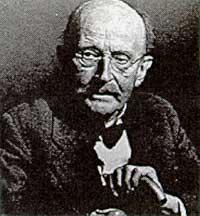Planck, Max
(1858-1947)
German physicist born in Kiel in 1858. He was still a cultured child when his family settled in Munich, where he completed his basic studies. When he arrived enough to go to college, he went to Berlin and was a student of Helmholtz.
He received his doctorate in 1878 and two years later entered the University of Munich. He was appointed professor at the University of Kiel in 1885 and spent the next four years there, until 1889am he obtained the chair of Physics at the University of Berlin.

Just knowing Clausius' work, Planck took care of thermodynamics. The debate on black bodies was fashionable at this time and focused on this problem. It can be said that it solved the debate that fundamentally originated the thermal balance of radiation and that its investigations established a milestone between classical physics and current physics. Planck was the first to extend the quantum hypothesis to explain how energy exchanges occur. According to their hypotheses, the energy of the atom cannot have any value, but a few certain values. In essence, this theory indicates that the variation of a magnitude does not occur continuously, that is, that this magnitude cannot encompass all two values. Each of the minimum changes that energy can undergo is known from the Planck as an amount. His theory was enunciated in 1900 by Planck, date that we can consider as a starting point of quantum theory and mechanics.
This new theory caused the effect of the earthquake among physicists. In 1918 he was awarded the Nobel Prize in Physics fully consolidating the value of Quantum Theory.
In 1930 he was appointed president of the Science Society "Guillermo Kaiser" and in his honor he was called Max Planck Institute. After seven years in this task, he resigned, as Hitler was in command and Planck was considered the enemy of the new regime. He had to endure harsh conditions of pressure, but continued in Germany and after Hitler's defeat he was again appointed president of the Institute bearing his name.
He spent the last years of his life in the city of Gotting. It was his arrival in 1947, at the age of 89.
Buletina
Bidali zure helbide elektronikoa eta jaso asteroko buletina zure sarrera-ontzian











